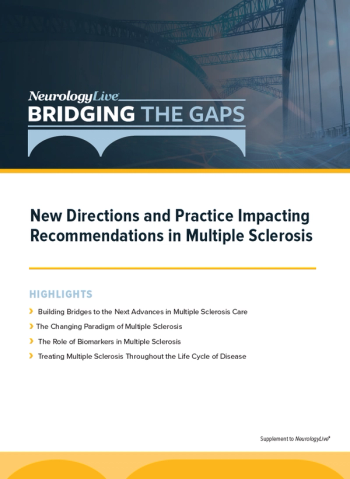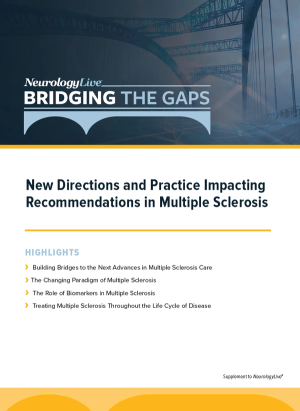Ahmed Zayed Obeidat, MD, PhD
Articles by Ahmed Zayed Obeidat, MD, PhD

Ahmed Obeidat, MD, PhD, Riley Bove, MD, Stephen Krieger, MD, and Erin Longbrake, MD, PhD, share perspectives on the future of MS care, the importance of vigilance in lab testing, and why patients may need reassurance about the potential for disease control with currently available therapies.

Ahmed Obeidat, MD, PhD, Riley Bove, MD, Stephen Krieger, MD, and Erin Longbrake, MD, PhD, discuss the need for biomarkers that can help guide the optimal dosing for the use of anti-CD20 therapies in a precision fashion.

Ahmed Obeidat, MD, PhD, Riley Bove, MD, Stephen Krieger, MD, and Erin Longbrake, MD, PhD, discuss the utility of real-world data, particularly when it comes to understanding subtle differences between agents from both a safety and efficacy perspective.

Ahmed Obeidat, MD, PhD, Riley Bove, MD, Stephen Krieger, MD, and Erin Longbrake, MD, PhD, discuss emerging the practical implications of long-term data for anti-CD20 agents.

Ahmed Obeidat, MD, PhD, and Riley Bove, MD, review strategies for how to make drug classes and the risks-benefits profiles of individual agents accessible to patients.

Ahmed Obeidat, MD, PhD, Riley Bove, MD, Stephen Krieger, MD, and Erin Longbrake, MD, PhD, review the benefits of exercise and physical activity in patients with MS. They also discuss strategies for talking to patients about the positive effects of lifestyle changes.

Ahmed Obeidat, MD, PhD, Riley Bove, MD, Stephen Krieger, MD, and Erin Longbrake, MD, PhD, talk about the importance of monitoring bladder dysfunction symptoms in MS care.

Ahmed Obeidat, MD, PhD, Riley Bove, MD, Stephen Krieger, MD, and Erin Longbrake, MD, PhD, review strategies for optimizing treatment of women with MS who are pregnant while minimizing risks. They also talk about evolving approaches to managing women who are breastfeeding.

Ahmed Obeidat, MD, PhD, Erin Longbrake, MD, PhD, Stephen Krieger, MD, and Riley Bove, MD, discuss differences in immunologic phenotypes across racial boundaries. They also discuss data showing that, despite these differences, response to high-efficacy agents appears to be consistent regardless of race.

Ahmed Obeidat, MD, PhD, Erin Longbrake, MD, PhD, Stephen Krieger, MD, and Riley Bove, MD, discuss strategies for personalizing decisions and mitigating risks when stopping medication.

Ahmed Obeidat, MD, PhD, Riley Bove, MD, Stephen Krieger, MD, and Erin Longbrake, MD, PhD, discuss the definition of high-efficacy therapy and its place in MS care.

Ahmed Obeidat, MD, PhD, Riley Bove, MD, Stephen Krieger, MD, and Erin Longbrake, MD, PhD, consider how clinical trials can be enhanced to account for diverse patient populations.

Ahmed Obeidat, MD, PhD, Riley Bove, MD, Stephen Krieger, MD, and Erin Longbrake, MD, PhD, talk about the need for shared decision-making in MS care.

Ahmed Obeidat, MD, PhD, Riley Bove, MD, Stephen Krieger, MD, and Erin Longbrake, MD, PhD, discuss the nuances of treatment selection based on age of onset of MS.

Ahmed Obeidat, MD, PhD, Riley Bove, MD, Stephen Krieger, MD, and Erin Longbrake, MD, PhD, review the practical application of PIRA in clinical approaches to addressing inflammation and slowing the progression of MS.

Ahmed Obeidat, MD, PhD, Stephen Krieger, MD, and Erin Longbrake, MD, PhD, explore the concept of progression independent of relapse activity (PIRA) and the challenges of defining subtle accumulation of disability.

Ahmed Obeidat, MD, PhD, Stephen Krieger, MD, and Riley Bove, MD, discuss evolving understandings of continuum of MS and the mechanisms that cause relapse and the gradual accumulation of disability.


Ahmed Zayed Obeidat MD, PhD; Ravi Dukkipati, MD; and Gabriel Pardo, MD, FAAN, share key takeaways for clinicians treating RRMS.

Expert neurologists highlight upcoming agents for the treatment of RRMS, focusing on biomarkers.

Experts in neurology provide insight on challenges that arise with the use of generic DMTs in RRMS treatment, such as cost to the patient.

Ahmed Zayed Obeidat MD, PhD; Ravi Dukkipati, MD; and Gabriel Pardo, MD, FAAN, comment on the use of generic DMTs in the treatment of RRMS, highlighting efficacy and safety data as well as level of equivalence to brand name treatments.

Expert neurologists discuss treatment options for a patient with comorbid autoimmune diseases, relapsing/remitting multiple sclerosis, and psoriasis.

Ravi Dukkipati, MD, and Gabriel Pardo, MD, FAAN, review the use of rituximab and other disease-modifying therapies in a patient with an established diagnosis of relapsing/remitting multiple sclerosis.

Ahmed Zayed Obeidat MD, PhD; Ravi Dukkipati, MD; and Gabriel Pardo, MD, FAAN, discuss a patient case with relapsing/remitting multiple sclerosis progression and share considerations for switching treatment.

Expert neurologists review treatment options for a young female with relapsing remitting multiple sclerosis (RRMS).

Ahmed Zayed Obeidat MD, PhD; Ravi Dukkipati, MD; and Gabriel Pardo, MD, FAAN, consider reasons to use generic disease-modifying therapies (DMTs) as a first-line therapy in the treatment of relapsing remitting multiple sclerosis (RRMS).

Experts in neurology highlight factors that lead them to choose certain therapies to treat relapsing remitting multiple sclerosis (RRMS), such as high efficacy in clinical trials.

Gabriel Pardo, MD, FAAN, describes the process that generic RRMS medications have to go through to be approved by the FDA, highlighting the abbreviated new drug application [ANDA] process.

Expert neurologists review availability of generic disease-modifying therapies [DMTs] and the effectiveness of reduced cost to the patient with RRMS










